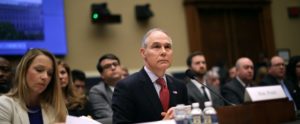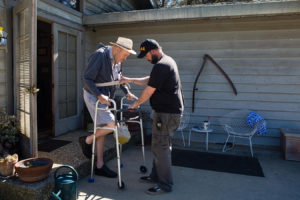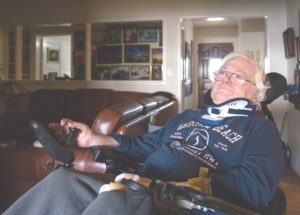 Volume 392, Number 10157
Volume 392, Number 10157
27 October 2018
WORLD REPORT A plan to expand immigrant children detention centres requires money from medical research and
health programmes. Susan Jaffe, The Lancet‘s Washington correspondent, reports.
 Volume 392, Number 10157
Volume 392, Number 10157
27 October 2018
WORLD REPORT A plan to expand immigrant children detention centres requires money from medical research and
health programmes. Susan Jaffe, The Lancet‘s Washington correspondent, reports.
Some physicians and patient advocates are concerned that the pursuit of lower Part B drug prices could endanger very sick Medicare Advantage patients if they can’t be treated promptly with the medicine that was their doctor’s first choice.
Starting next year, Medicare Advantage plans will be able to add restrictions on expensive, injectable drugs administered by doctors to treat cancer, rheumatoid arthritis, macular degeneration and other serious diseases.
Under the new rules from Medicare, these private Medicare insurance plans could require patients to try cheaper drugs first. If those are not  effective, then the patients could receive the more expensive medication prescribed by their doctors.
effective, then the patients could receive the more expensive medication prescribed by their doctors.
Insurers use such “step therapy” to control drug costs in the employer-based insurance market as well as in Medicare’s stand-alone Part D prescription drug benefit, which generally covers medicine purchased at retail pharmacies or through the mail. The new option allows the private Medicare plans — an alternative to traditional, government-run Medicare — to extend that cost-control strategy to these physician-administered drugs.
…Critics of the new policy, part of the administration’s efforts to fulfill President Donald Trump’s promise to cut drug prices, say it lacks some crucial details, including how to determine when a less expensive drug isn’t effective. [Continued at Kaiser Health News and NPR]
 Volume 392, Number 10149
Volume 392, Number 10149
1 September 2018
WORLD REPORT The single-payer national health-care bill, so-called Medicare for All, is gaining momentum with the public but is stalling in Congress. Susan Jaffe, The Lancet‘s Washington correspondent, reports.
 Volume 392, Number 10144
Volume 392, Number 10144
28 July 2018
WORLD REPORT If confirmed, Kavanaugh could tilt the court toward the president’s views on US public health policy. Susan Jaffe, The Lancet‘s Washington correspondent, reports.

Susan Jaffe | Washington Correspondent for The Lancet | 10th July 2018
After winning a federal court decision to stop Kentucky from requiring some Medicaid patients find paid or volunteer work to keep their coverage, beneficiary advocates are considering legal challenges to stop similar efforts in other states.
![]() The victory may expose a major flaw in the Trump Administration’s effort to reshape the Medicaid program, advocates say. But others claim the flaw is in the court decision. [Continued here.]
The victory may expose a major flaw in the Trump Administration’s effort to reshape the Medicaid program, advocates say. But others claim the flaw is in the court decision. [Continued here.]
Sometimes a drug plan’s copay is higher than the cash, but insurers’ “gag orders” keep pharmacists from telling Medicare beneficiaries. A little-known Medicare rule requires pharmacists to divulge the lower cash price if patients ask.
As part of President Donald Trump’s blueprint to bring down prescription costs, Medicare officials have warned insurers that “gag orders”

Scott Olson/Getty Images
keeping pharmacists from alerting seniors that they could save money by paying cash — rather than using their insurance — are “unacceptable and contrary” to the government’s effort to promote price transparency.
But the agency stopped short of requiring insurers to lift such restrictions on pharmacists.
That doesn’t mean people with Medicare drug coverage are destined to overpay for prescriptions. Under a little-known Medicare rule, they can pay a lower cash price for prescriptions instead of using their insurance. But first, they must ask the pharmacist about that option…. [Continued at Kaiser Health News, NPR and CNN Money]
 Volume 391, Number 10139
Volume 391, Number 10139
23 June 2018
WORLD REPORT Months after the Trump Administration said that there is no ban on gun violence studies, the CDC still lacks the funding to proceed. Susan Jaffe, The Lancet‘s Washington correspondent, reports.
…Appeals for immediate federal action to make schools and communities safer have so far largely gone unanswered. And legislative efforts languish in Congress, as the chairman of a key congressional committee that oversees federal health programmes has so far resisted requests by its Democratic members to hold hearings on preventing gun violence [continued here].
 Volume 391, Number 10136
Volume 391, Number 10136
2 June 2018
WORLD REPORT The president’s wide-ranging plan to reduce prescription drug prices won’t be easy to achieve, experts say. Susan Jaffe, The Lancet’s Washington correspondent, reports.
“We will have tougher negotiation, more competition, and much lower prices at the pharmacy counter. And it will start to take effect very soon“, said President Donald Trump.
How soon will depend on what steps the administration takes on its own, through regulations and other mandates, and what changes can only be achieved through new laws enacted by Congress, which will increasingly be preoccupied by November’s election. [Continued here.]
Susan Jaffe | Washington Correspondent for The Lancet | 8th May 2018
![]() At last count, at least four federal agencies were conducting nearly a dozen investigations of Environmental Protection Agency chief Scott Pruitt, probing his office renovations, a round-the-clock security unit who accompanied him on a trip to Disneyland, personnel management, and first-class air travel. The Capitol Hill condo he rented at a bargain rate of only $50 a night from the wife of an energy industry lobbyist has also come under scrutiny.
At last count, at least four federal agencies were conducting nearly a dozen investigations of Environmental Protection Agency chief Scott Pruitt, probing his office renovations, a round-the-clock security unit who accompanied him on a trip to Disneyland, personnel management, and first-class air travel. The Capitol Hill condo he rented at a bargain rate of only $50 a night from the wife of an energy industry lobbyist has also come under scrutiny.

Environmental Protection Agency Administrator Scott Pruitt testifies at a congressional hearing April 26, 2018 (Getty Images).
But in separate hearings held by the congressional subcommittees that oversee EPA, Pruitt dismissed the investigations as politically motivated.
“Those who attack the EPA and attack me are doing so because they want to attack and derail the president’s agenda and undermine this administration’s priorities,” Pruitt told the congressional panels two weeks ago. “I am simply not going to let that happen.”
…Republicans were eager to praise his achievements during the hearings, and encouraged him to keep at it. [Continued here]
 Volume 391, Number 10131
Volume 391, Number 10131
28 April 2018
WORLD REPORT Frustrated by what they say is the US Government’s disregard for science, more scientists and physicians are entering politics. Susan Jaffe, The Lancet’s Washington correspondent, reports.

Nuclear engineer Elaine Luria running for Congress in southeast Virginia (photo/elaineforcongress.com)
Scientists, physicians, engineers, and their supporters surprised many people—and maybe themselves—when they assembled in cities across the USA a year ago demanding an end to President Donald Trump’s Administration’s so-called war on science, which has attacked climate change, environmental protection laws, and funds for biomedical research, among other targets.
But, for some critics, protests are not enough. Instead of appealing to elected officials, now they want to take their place.
“…More and more scientists realise that they have… an obligation to see that the idea of science is defended, that evidence is respected, and that the conditions for science to thrive are respected”, said Rush Holt, chief executive officer of the American Association for the Advancement of Science. [Continued here.]

The Institute for Aging in San Francisco helps seniors get to doctor appointments and social activities. (Photo/Susan Jaffe)
Susan Jaffe | Washington Correspondent for The Lancet | 28th March 2018
![]() A day after the horrific mass shooting at Marjory Stoneman Douglas High School in Parkland, Florida on February 14, where 17 students and faculty were murdered and 14 injured, Health and Human Services Secretary Alex Azar fielded budget questions from a congressional committee. In response to Representative Kathy Castor, a Democrat from Tampa, Florida, Azar said there is no restriction on the ability of the Centers for Disease Control and Prevention (CDC) to conduct research into the causes of gun violence.
A day after the horrific mass shooting at Marjory Stoneman Douglas High School in Parkland, Florida on February 14, where 17 students and faculty were murdered and 14 injured, Health and Human Services Secretary Alex Azar fielded budget questions from a congressional committee. In response to Representative Kathy Castor, a Democrat from Tampa, Florida, Azar said there is no restriction on the ability of the Centers for Disease Control and Prevention (CDC) to conduct research into the causes of gun violence.
Questions about CDC’s ability to investigate gun violence—as it

“March for Our Lives” rally in Washington, D. C. March 24, 2018. (Photo/Susan Jaffe)
would other public health threats—have persisted ever since Congress passed the 1996 Dickey Amendment prohibiting the use of research funds to advocate or promote gun control.
“We don’t believe that it gets in the way of our ability to do violence research or firearms violence research at any part of HHS,” Azar told another congressional panel a month later. “I think we’ve now made it quite publicly—and within the administration—clear that we don’t see any barriers around violence or firearm violence research. We’re in the evidence and science-gathering business.”
His assurances were also included in the instructions that accompanied the budget agreement Congress approved and President Donald Trump signed into law last week. While some observers believe this means CDC has permission from Congress to proceed, some leading experts in firearms research are skeptical. There may be no barriers, but they say there’s no funding either.[Continued here]
 Volume 391, Number 10126
Volume 391, Number 10126
WORLD REPORT Medicaid work requirements would make the health insurance programme a pathway out of poverty, say top US health officials. Susan Jaffe, The Lancet’s Washington correspondent, reports.
Beneficiaries can lose their health care if they fail to pay a premium, submit documentation that they qualify for an exemption, or to report a change in eligibility. “All roads lead to people being terminated from the programme or locked out of coverage,” said Leonardo Cuello, an attorney and director of health policy at the National Health Law Program in Washington, DC.
“This is not about punishing anyone”, said Arkansas Governor Asa Hutchinson. “It’s about giving people an opportunity to work and give them the training they need and help them move out of poverty and up the economic ladder.” [Full article here.]
Last month’s budget deal means Medicare beneficiaries are eligible for physical and occupational therapy indefinitely. Plus, prescription drug costs will fall for more seniors.
Physical therapy helps Leon Beers, 73, get out of bed in the morning and

Leon Beers gets help from caregiver Timothy Wehe. (Bert Johnson for KHN)
maneuver around his home using his walker. Other treatment strengthens his throat muscles so that he can communicate and swallow food, said his sister Karen Morse. But in mid-January, his home health care agency told Morse it could no longer provide these services because he had used all his therapy benefits allowed under Medicare for the year.
… Under a recent change in federal law, people who qualify for Medicare’s [physical, occupational and speech] therapy services will no longer lose them solely because they used too much.
“It is a great idea,” said Beers. “It will help me get back to walking.” [Continued at Kaiser Health News, NPR and The Washington Post]

Colin Campbell (Heidi de Marco/KHN)
Colin Campbell needs help dressing, bathing and moving between his bed and his wheelchair. He has a feeding tube because his partially paralyzed tongue makes swallowing “almost impossible,”he said.
Campbell, 58, spends $4,000 a month on home health care services so he can continue to live in his home just outside Los Angeles. Eight years ago, he was diagnosed with amyotrophic lateral sclerosis, or “Lou Gehrig’s disease,” which relentlessly attacks the nerve cells in his brain and spinal cord and has no cure.
The former computer systems manager has Medicare coverage because of his disability, but no fewer than 14 home health care providers have told him he can’t use it to pay for their services. That’s an incorrect but common belief…. [Continued at Kaiser Health News and NPR]